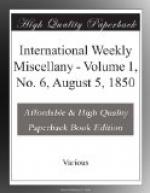“If Longfellow’s poetry is best designated as quaint, Poe’s may most properly be characterized as fantastic. The best of it reminds one of Tennyson, not by any direct imitation of particular passages, but by its general air and tone. But he was very far from possessing Tennyson’s fine ear for melody. His skill in versification, sometimes striking enough, was evidently artificial; he overstudied metrical expression and overrated its value so as sometimes to write, what were little better than nonsense-verses, for the rhythm. He had an incurable propensity for refrains, and when he had once caught a harmonious cadence, appeared to think it could not be too often repeated. Poe’s name is usually mentioned in connection with The Raven, a poem which he published about five years ago. It had an immense run, and gave rise to innumerable parodies—those tests of notoriety if not of merit. And certainly it is not without a peculiar and fantastic excellence in the execution, while the conception is highly striking and poetic. This much notice seems due to a poem which created such a sensation in the author’s country. To us it seems by no means the best of Poe’s productions; we much prefer, for instance, this touching allegory, which was originally embodied in one of his wildest tales, The Haunted Palace. In the very same volume with this are some verses that Poe wrote when a boy, and some that a boy might be ashamed of writing. Indeed the secret of rejection seems to be little known to Transatlantic bards. The rigidness of self-criticism which led Tennyson to ignore and annihilate, so far as in him lay, full one half of his earlier productions, would hardly be understood by them. This is particularly unlucky in the case of Poe, whose rhymes sometimes run fairly away with him, till no purpose or meaning is traceable amid a jingle of uncommon and fine-sounding words....
“Though Poe was a Southerner, his poetry has nothing in it suggestive of his peculiar locality. It is somewhat remarkable that the slave-holding, which has tried almost all other means of excusing or justifying itself before the world, did not think of ‘keeping a poet,’ and engaging the destitute author from its own territory to sing the praises of ‘the patriarchal institution.’ And it would have been a fair provocation that the Abolitionists had their poet already. Indeed several of the northern poets have touched upon this subject; Longfellow, in particular, has published a series of spirited and touching anti-slavery poems; but the man who has made it his specialite is JOHN GREENLEAF WHITTIER, a Quaker, literary editor of the National Era, an Abolition and ultra-Radical paper, which, in manful despite of Judge Lynch, is published at Washington, between the slave-pens and the capitol. His verses are certainly obnoxious to the jurisdiction of that notorious popular potentate, being unquestionably ‘inflammatory, incendiary, and insurrectionary,’ as the Southern formula goes, in a very high degree. He makes passionate appeals to the Puritan spirit of New England, and calls on her sons to utter their voice,




